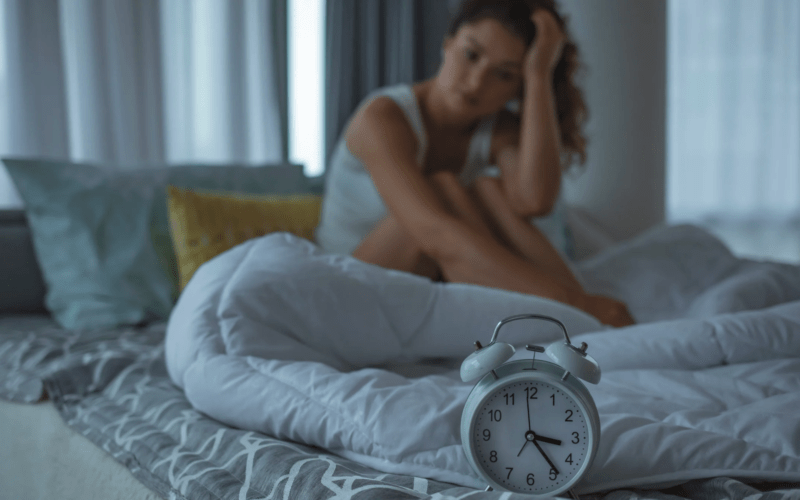Research shows that the general population experiences depersonalization-derealization disorder, with higher rates in clinical settings, underscoring its role as a public health concern.
When we experience poor sleep quality or insufficient rest, our perception of reality can become distorted, potentially worsening feelings of detachment from ourselves and our surroundings. Understanding this connection is crucial for anyone struggling with these symptoms.
The Neurobiological Connection Between Sleep and Depersonalization
The connection between sleep and dissociative experiences offers deep insight into how our brains regulate consciousness. Disruptions in sleep patterns can impair the neurological systems responsible for maintaining a stable perception of reality. As our brains cycle through different states of consciousness, the boundaries between wakefulness and sleep may blur, especially in individuals experiencing depersonalization.
This blurring can create a neurobiological environment where dissociative symptoms intensify. Poor sleep efficiency impairs self-awareness and environmental processing, directly contributing to feelings of detachment.
Additionally, anomalies in REM sleep, critical for memory consolidation and emotional regulation can trigger dreamlike intrusions during wakefulness, worsening depersonalization symptoms.
How Sleep Deprivation Triggers and Worsens DPDR
Sleep loss can both trigger new episodes of depersonalization and intensify existing symptoms through several cognitive and neurological mechanisms. This bidirectional relationship creates challenging cycles for those affected.
The Intrusion of Dreamlike Mentation into Waking States
When chronically sleep-deprived, the boundaries between dreaming and waking consciousness can weaken. This permeability allows dreamlike thought patterns to intrude during wakefulness, contributing to the surreal quality of experience reported in Depersonalization-Derealization Disorder Treatment contexts.
These intrusions can blur reality testing, making it harder for individuals to stay grounded in their daily lives. Addressing sleep disturbances is therefore essential for restoring clearer cognitive boundaries and a stable sense of self.
Cognitive Impacts of Sleep Loss on Reality Processing
Sleep deprivation diminishes the brain’s ability to properly process sensory information and maintain a stable sense of self. Even a single night of insufficient sleep can trigger depersonalization in vulnerable individuals, as the brain’s reality-testing functions become compromised.
Memory Consolidation Failures and DPDR
Sleep plays a crucial role in consolidating memories and integrating new experiences into our sense of self. Disrupted sleep prevents this process, potentially contributing to the fragmented sense of identity that characterizes depersonalization experiences.
The relationship between sleep deprivation and DPDR symptoms demonstrates why addressing sleep must be a cornerstone of effective treatment strategies.
Sleep Disruptions Common in DPDR Patients
People experiencing depersonalization-derealization disorder often report distinctive patterns of sleep disturbance that differ from those seen in other conditions. Recognizing these patterns is essential for comprehensive treatment approaches.
Poor Sleep Efficiency Profiles
Individuals with DPDR frequently exhibit fragmented sleep with multiple brief awakenings they might not even remember. This pattern results in poor sleep efficiency despite potentially adequate total sleep duration. Their sleep may appear normal on the surface while actually failing to provide restorative benefits.
Multiple Sleep Episodes and Daytime Napping
Many DPDR patients develop irregular sleep patterns characterized by multiple short sleep episodes throughout the 24-hour cycle rather than one consolidated nighttime sleep period. This fragmentation can further disrupt the normal boundaries between consciousness states and worsen symptoms of dissociation.
Sleep-Onset and Maintenance Insomnia
Difficulty falling asleep (onset insomnia) and staying asleep (maintenance insomnia) are commonly reported by those with DPDR. The anxiety about sleep itself can create a vicious cycle, as worry about sleep disruption can trigger heightened depersonalization experiences.
Understanding these sleep disruption patterns provides important diagnostic clues and treatment targets for clinicians working with DPDR patients.
The Critical Role of Sleep Efficiency vs Sleep Duration
When it comes to managing DPDR symptoms, the quality of your sleep matters significantly more than simply how many hours you spend in bed. This distinction helps explain why some patients report adequate sleep duration yet still experience worsening symptoms.
Sleep Efficiency Over Quantity
- Research shows that sleep efficiency—the percentage of time in bed actually spent sleeping—has a stronger correlation with depersonalization symptom severity than total hours slept.
Eight Hours Isn’t Always Enough
- Simply being in bed for eight hours doesn’t guarantee rest. Frequent awakenings and restlessness reduce sleep quality, diminishing its mental health benefits.
Tools for Measuring Sleep Quality
- Clinicians use tools like sleep diaries, actigraphy devices, and formal sleep studies to measure sleep efficiency, offering more accurate insights than asking about total sleep time.
Importance of Deep Sleep
- Slow-wave sleep stages (deep sleep) play a critical role in protecting against dissociative symptoms by supporting the integration of consciousness disrupted in DPDR.
Targeted Interventions Matter
- Focusing on improving sleep efficiency, rather than just increasing time in bed, provides a more effective approach for managing symptoms in DPDR patients.
Integrating Sleep Hygiene into DPDR Treatment Plans
Incorporating proper sleep hygiene into depersonalization-derealization disorder (DPDR) treatment can significantly enhance symptom management and recovery. Sleep hygiene encompasses everyday habits that support consistent, restorative sleep, such as maintaining a regular bedtime, limiting screen exposure before sleep, avoiding stimulants like caffeine in the evening, and creating a quiet, dark, and cool sleeping environment.
These practices help reinforce the brain’s natural sleep-wake cycle, which is often disrupted in DPDR patients. When paired with therapeutic approaches like cognitive-behavioral therapy or mindfulness techniques, sleep hygiene can play a pivotal role in stabilizing perception and reducing the intensity of dissociative experiences.
FAQs
Does Improving Sleep Help Reduce Depersonalization Symptoms?
Yes, improving sleep quality often leads to significant reductions in depersonalization symptoms. Research shows that normalizing sleep patterns can decrease dissociative experiences by strengthening the boundaries between different states of consciousness, helping your brain more clearly distinguish between sleeping and waking states.
How Quickly Might Sleep Improvements Affect DPDR Symptoms?
While individual responses vary, many people notice improvements within days to weeks of establishing healthier sleep patterns. Sleep disorders and anxiety often create a vicious cycle with dissociative symptoms, so breaking this cycle through consistent sleep improvement can produce noticeable benefits relatively quickly.
Can Certain Sleep Positions Affect Depersonalization?
There’s no strong evidence that specific sleep positions directly impact depersonalization symptoms. However, choosing positions that enhance your personal sleep quality and reduce disruptions may indirectly help by improving overall sleep efficiency and continuity throughout the night.
Final Thoughts
The relationship between sleep and depersonalization is complex but increasingly well-understood. By recognizing the critical role that quality sleep plays in managing depersonalization, individuals can take meaningful steps toward symptom reduction.
The neurobiological connections between sleep disturbance and dissociative experiences point to sleep optimization as a fundamental component of effective treatment.
Whether you’re experiencing occasional depersonalization episodes or diagnosed with DPDR, paying attention to your sleep habits may provide significant relief. Working with healthcare providers to address both sleep issues and dissociative symptoms simultaneously offers the most promising path forward.












